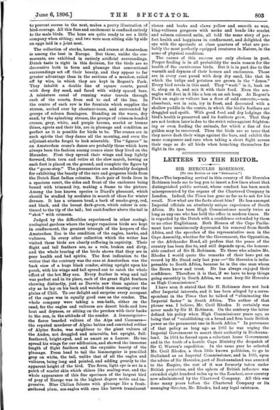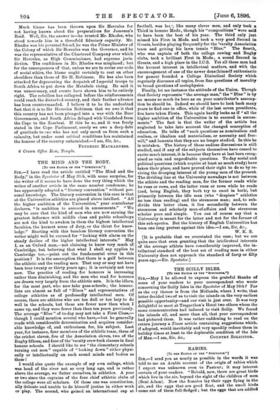LETTERS TO THE EDITOR.
SIR HERCULES ROBINSON.
[TO THE EDITOR OR IRE " EPECTATOR.”1
Sin,—The impending arrival in this country of Sir Hercules Robinson leads me to beg you to insert a few lines about that distinguished public servant, whose conduct has been much misrepresented by the organs of the Chartered Company in London. Indeed, the Times has gone so far as to ask for his recall. Now what are the facts about him? He has amongst Imperial officials an absolutely unique experience of South Africa. He has been High Commissioner nearly twice as long as any one who has held the office in modern times. He is regarded by the Dutch with a confidence extended by them to no other Englishman. Both Houses of the Cape Parlia- ment have unanimously deprecated his removal from South Africa, and the speeches of the representative men in the Cape Assembly, whether for the Government, the Opposition, or the Afrikander Bond, all profess that the peace of the country has been due to, and still depends upon, the honour- able conduct of Sir H. Robinson. To those who admire Mr. Rhodes I would quote the remarks of their hero put on record by Mr. Stead only last year :—" Sir Hercules is indis- pensable to South Africa, because he is the one man whom the Boers know and trust. He has always enjoyed their confidence. Therefore it is that, if we have to keep things going smoothly in South Africa., we must keep Sir Hercules as High Commissioner."
I have seen it stated that Sir H. Robinson does not look after Imperial interests, and it has been alleged by a corre- spondent in the Times that he talked of "eliminating the Imperial factor" in South Africa. The author of that phrase was, I believe, Mr. Cecil Rhodes. It certainly was never made by Sir H. Robinson. On the contrary the latter defined his policy when High Commissioner years ago, as being that of "establishing on a broad and firm basis British power as the paramount one in South Africa." In pursuance of that policy as long ago as 1883 ho was urging the Imperial Government to assert their authority in Bechuana- land. In 1884 he forced upon a reluctant home Government and in the teeth of a hostile Cape Ministry the despatch of Sir C. Warren's expedition. In the same year he selected Mr. Cecil Rhodes, a then little known politician, to go to Stellaland as an Imperial Commissioner, and in 1885, upon the advice of Sir Hercules, part of Becbuanaland was annexed to the Empire, the rest of it was formerly taken under British protection, and the sphere of British influence was extended eight hundred miles up to the Zambesi, over country now administered by the Chartered Company. All this was done many years before the Chartered Company or its managing director, Mr. Rhodes, had any legal existence.
Much blame has been thrown upon Sir Hercules for not having known about the preparations for Jameson's Raid. Well, Sir, the answer is—he trusted Mr. Rhodes, who stood towards him in a threefold fiduciary capacity. Mr. Rhodes was his personal friend, he was the Prime Minister of the Colony of which Sir Hercules was the Governor, and he was the representative of the Chartered Company over which Sir Hercules, as High Commissioner, had supreme juris- diction. The confidence in Mr. Rhodes was misplaced; but for the consequences of that, unless we are to revise our code of social ethics, the blame ought certainly to rest on other shoulders than those of Sir H. Robinson. He has also been attacked for deprecating the despatch of Imperial troops to South Africa to put down the Matabele rising. He said it was unnecessary, and events have shown him to be entirely right. The rebellion has collapsed before the reinforcements could reach the disturbed country, and their further advance has been countermanded. I believe it to be the undoubted fact that it is to Sir Hercules Robinson that we owe it that this country has not been plunged into a war with the Boer Government, and South Africa deluged with bloodshed from the Cape to the Zambesi. If this be so, and it was freely stated in the Cape Parliament, surely we owe a deep debt of gratitude to one who has not only saved us from such a calamity, but under most critical conditions has maintained the honour of the country untarnished.—I am, Sir, &c., 6 Crown Office Raw, Temple. FREDERIC MACKARNESS.







































 Previous page
Previous page